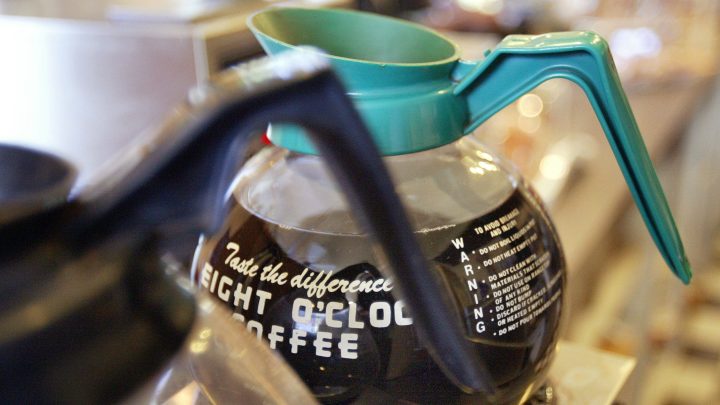
What’s all the buzz about decaf coffee?

Drinking coffee is a global habit. Around the world, people sip about 3 billion cups a day, making the industry more than $200 billion a year.
In the United States, just about 15% of the coffee consumed is decaffeinated. But that number is gaining steam.
Matt Kronsberg a freelance reporter for Bloomberg Businessweek, joined “Marketplace’s” Kai Ryssdal to talk about how decaf coffee is winning over full-strength drinkers, and where the industry goes from here. An edited transcript of their conversation is below.
Kai Ryssdal: Tell me, first of all, about this big win that — oh, my goodness — decaf coffee just had in a big competition.
Matt Kronsberg: Sure. Back in March, they held the Brewers Cup competition in Rancho Cucamonga, California. And it was a gathering of specialty coffee professionals, people who make beautiful triple lattes and just really fancy stuff. And so Weihong Zhang, a coffee maker from Houston, came and he won the Brewers Cup, which is for pour-over style coffee. But he won it with decaf, which is kind of like winning the Tour de France on a unicycle.
Ryssdal: So, look, I’m a coffee snob, up front. Never had a cup of decaf that tastes like an actual decent cup of coffee. How did decaf get to this point where it’s now winning these competitions?
Kronsberg: It’s been improving a lot over the years. Basically since about 2007, the quality of the process of removing the caffeine improved. And it stopped being this kind of really harsh chemically kind of taste that people learned to expect. And as that happened, growers started getting more comfortable submitting better coffees to be decaffeinated. And so it was sort of a virtuous cycle where, you know, as the process improved, the beans improved. As the beans improved, the coffee tasted better, and people got more willing to go long on it.
Ryssdal: Yeah, amazing statistic in this piece from SkyQuest Technology that you quoted: decaf market — decaf coffee only — from $20 billion a couple of years ago to almost $30 billion by the end of the decade. That’s kind of amazing.
Kronsberg: It is. I mean, it’s enough to get your heart rate up a little bit, which is great if the coffee isn’t going to do it.
Ryssdal: That’s right, which, of course, means companies are in on this thing. Blue Bottle is one, there are a bunch of others.
Kronsberg: And it’s not just the big ones. I mean, companies like Blue Bottle always have strong contingents of people who, for whatever reason, if they’re pregnant, or, you know, just anxiety issues, or just coming in in the afternoon, wanting to have a decaf. But it also means that smaller roasters, smaller growers, you’re really seeing it across the board. I spoke to Adam Paronto who has a company in Chicago called Reprise Coffee Roasters, and they’ve gone even a little bit farther, and they’re not just offering decaf, but a wider range of caffeinated levels. They’ve got a zero, which is 99.99% caffeine-free, but they also offer a microdose that’s only 10% caffeine, and a light buzz that’s 25%.
Ryssdal: I suppose this shouldn’t be surprising, this rise of decaf in an era where nonalcoholic cocktails are a thing and nonmeat meat products are a thing, right? I mean, people are, you know, they’ve got this on the mind.
Kronsberg: Absolutely. I mean, and that was what Adam from Reprise said. He said, “People want their drugs without their drugs.” Coffee still just lights up your brain in a way that nothing else does.
Ryssdal: This Brewers Cup win has been compared to that very famous 1976 win by California wines at this big competition in France, and American wine sales, you know, took off after that. Do you suppose decaf sales take off after this?
Kronsberg: Do I think they’ll take off? Will they skyrocket? Probably not. But I think there’s going to be continued steady growth and people are going to go into their favorite snobby kind of coffee places and seeing decaf put front and center. And I think that’s going — to change perceptions takes time. But it’s very much on the right path. And, actually, decaf has grown in sales faster than regular coffee every year for the last seven years.
Ryssdal: Are you a decaf guy or are you a high-test guy?
Kronsberg: I’m a high-test guy, but I’m coming around to it. I’ve had some really beautiful cups of decaf, and it’s making me think that an afternoon cup could be part of my ritual soon.
There’s a lot happening in the world. Through it all, Marketplace is here for you.
You rely on Marketplace to break down the world’s events and tell you how it affects you in a fact-based, approachable way. We rely on your financial support to keep making that possible.
Your donation today powers the independent journalism that you rely on. For just $5/month, you can help sustain Marketplace so we can keep reporting on the things that matter to you.











